
-
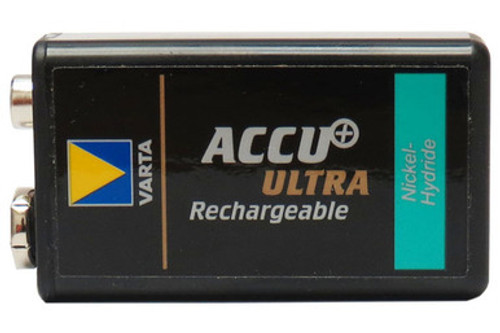
7.2 Volt Varta 150 mAh 6/8H NiMH Battery (9 Volt Size)
As low as:- Buy in bulk and save
Bulk discount rates
Below are the available bulk discount rates for each individual item when you purchase a certain amount
- Buy 2 - 8 and pay only $19.39 each
- Buy 9 - 16 and pay only $18.89 each
- Buy 17 - 32 and pay only $18.49 each
- Buy 33 - 64 and pay only $17.69 each
- Buy 65 or above and pay only $17.69 each
-
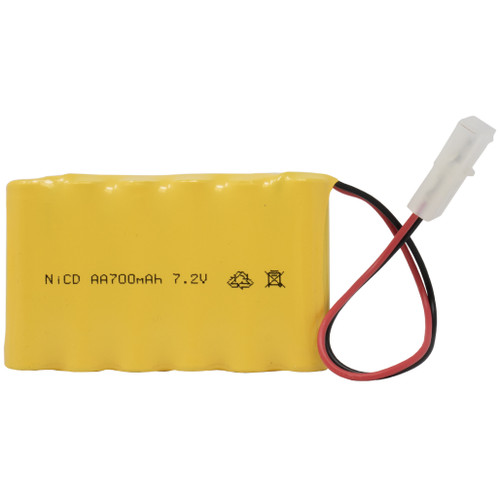
7.2 Volt NiCd Battery Pack (700 mAh) with Tamiya Connector
$20.99As low as:- Buy in bulk and save
Bulk discount rates
Below are the available bulk discount rates for each individual item when you purchase a certain amount
- Buy 2 - 5 and pay only $20.99 each
- Buy 6 - 11 and pay only $19.49 each
- Buy 12 - 23 and pay only $18.89 each
- Buy 24 - 47 and pay only $17.79 each
- Buy 48 or above and pay only $17.79 each
-
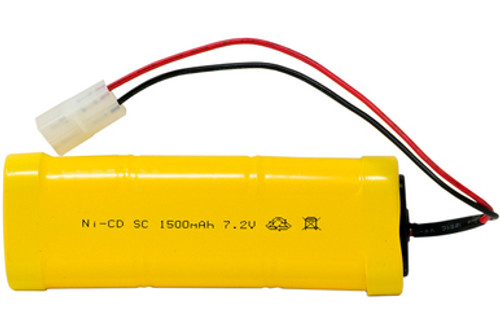
7.2 Volt NiCd Battery Pack (1500 mAh) with Tamiya Connector
$21.59As low as:- Buy in bulk and save
Bulk discount rates
Below are the available bulk discount rates for each individual item when you purchase a certain amount
- Buy 2 - 5 and pay only $21.59 each
- Buy 6 - 11 and pay only $20.09 each
- Buy 12 - 23 and pay only $19.39 each
- Buy 24 - 46 and pay only $18.29 each
- Buy 47 or above and pay only $18.29 each
-

-

7.2 Volt NiMH Battery Pack (1000 mAh) with Leads
$26.99As low as:- Buy in bulk and save
Bulk discount rates
Below are the available bulk discount rates for each individual item when you purchase a certain amount
- Buy 2 - 4 and pay only $26.99 each
- Buy 5 - 9 and pay only $25.09 each
- Buy 10 - 18 and pay only $24.29 each
- Buy 19 - 37 and pay only $22.89 each
- Buy 38 or above and pay only $22.89 each
-

-

-

-

7.2 Volt NiCd Battery Pack (2100 mAh) with Tamiya Connector
$29.99As low as:- Buy in bulk and save
Bulk discount rates
Below are the available bulk discount rates for each individual item when you purchase a certain amount
- Buy 2 - 3 and pay only $29.99 each
- Buy 4 - 8 and pay only $27.89 each
- Buy 9 - 16 and pay only $26.99 each
- Buy 17 - 33 and pay only $25.49 each
- Buy 34 or above and pay only $25.49 each
-

-

7.2 Volt (3 x 2) NiMH Battery Pack (2200 mAh) with Leads
$32.99As low as:- Buy in bulk and save
Bulk discount rates
Below are the available bulk discount rates for each individual item when you purchase a certain amount
- Buy 2 - 3 and pay only $32.99 each
- Buy 4 - 7 and pay only $30.69 each
- Buy 8 - 15 and pay only $29.69 each
- Buy 16 - 30 and pay only $27.99 each
- Buy 31 or above and pay only $27.99 each
-

-
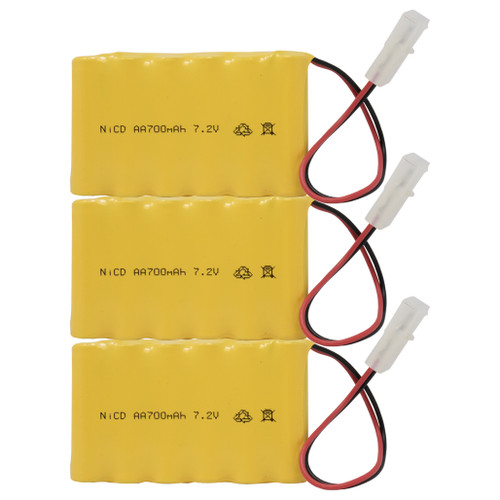
-

-

7.2 Volt NiMH Battery Pack (2200 mAh) with Leads
$36.29As low as:- Buy in bulk and save
Bulk discount rates
Below are the available bulk discount rates for each individual item when you purchase a certain amount
- Buy 2 - 3 and pay only $36.29 each
- Buy 4 - 6 and pay only $33.69 each
- Buy 7 - 13 and pay only $32.69 each
- Buy 14 - 27 and pay only $30.79 each
- Buy 28 or above and pay only $30.79 each
-

-
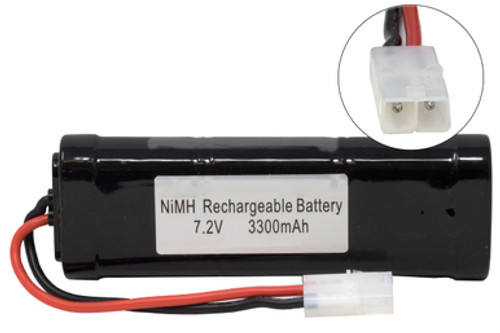
7.2 Volt NiMH Battery Pack (3300 mAh) with Tamiya Connector
$41.99As low as:- Buy in bulk and save
Bulk discount rates
Below are the available bulk discount rates for each individual item when you purchase a certain amount
- Buy 2 - 3 and pay only $41.99 each
- Buy 4 - 5 and pay only $38.99 each
- Buy 6 - 11 and pay only $37.79 each
- Buy 12 - 23 and pay only $35.69 each
- Buy 24 or above and pay only $35.69 each
-

7.2 Volt NiMH Battery Pack (4200 mAh) with Tamiya Connector
$48.79As low as:- Buy in bulk and save
Bulk discount rates
Below are the available bulk discount rates for each individual item when you purchase a certain amount
- Buy 2 - 3 and pay only $48.79 each
- Buy 4 - 5 and pay only $45.39 each
- Buy 6 - 10 and pay only $43.89 each
- Buy 11 - 20 and pay only $41.49 each
- Buy 21 or above and pay only $41.49 each
-
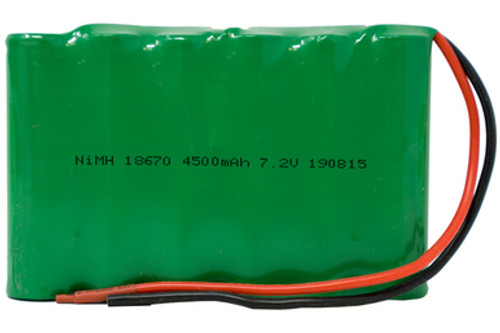
7.2 Volt NiMH Battery Pack (4500 mAh) with Leads
$53.29As low as:- Buy in bulk and save
Bulk discount rates
Below are the available bulk discount rates for each individual item when you purchase a certain amount
- Buy 2 - 3 and pay only $53.29 each
- Buy 4 - 5 and pay only $49.49 each
- Buy 6 - 9 and pay only $47.96 each
- Buy 10 - 18 and pay only $45.29 each
- Buy 19 or above and pay only $45.29 each
-
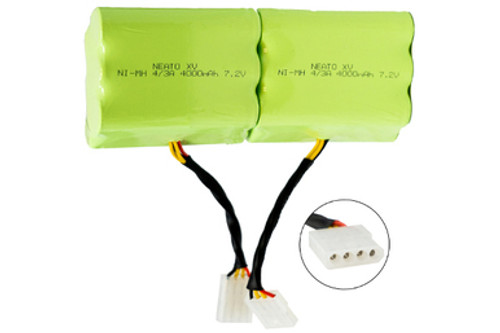
7.2 Volt Battery Packs: Choosing Between NiCd and NiMH
7.2 Volt battery packs are widely used rechargeable power sources in various applications, including power tools, remote-controlled vehicles, and household devices. Two popular types of 7.2 Volt battery packs are those based on Nickel-Cadmium (NiCd) and Nickel-Metal Hydride (NiMH) chemistries. Each offers distinct advantages and limitations, making it essential to choose the right type for your specific needs.
Understanding 7.2 Volt Battery Packs
Both NiCd and NiMH batteries operate by storing and releasing energy through chemical reactions involving nickel-based cathodes. Despite their similarities, they differ in their primary components and performance characteristics:
NiCd (Nickel-Cadmium) Battery Packs
Composition: Made with nickel and cadmium as the active materials.
History: One of the earliest rechargeable battery technologies, known for its durability and reliability.
Performance: Delivers high output power and excellent current handling, making it ideal for high-drain applications.
NiMH (Nickel-Metal Hydride) Battery Packs
Composition: Uses nickel and a hydrogen-absorbing alloy as the primary materials.
Environmental Impact: Considered more eco-friendly than NiCd due to the absence of cadmium.
Performance: Offers higher energy capacity and eliminates the memory effect, improving reliability over time.
Key Advantages of 7.2 Volt NiCd Battery Packs
High Output Power:
NiCd batteries excel in high-drain applications like power tools, delivering consistent performance even under heavy loads.
Quick Recharging:
These batteries recharge faster than many other rechargeable chemistries, minimizing downtime in frequently used devices.
Durability:
Known for their ruggedness, NiCd batteries can handle extreme conditions and frequent charge/discharge cycles without significant performance loss.
Long Cycle Life:
NiCd batteries can be recharged hundreds of times, making them cost-effective for devices used regularly.
Drawbacks of NiCd Battery Packs
Memory Effect:
If not fully discharged before recharging, NiCd batteries may lose some of their capacity over time, reducing their overall lifespan.
Toxic Cadmium:
Cadmium is a hazardous substance that requires careful disposal to avoid environmental damage.
Lower Energy Capacity:
NiCd batteries typically have less energy capacity compared to NiMH batteries of the same size.
Key Advantages of 7.2 Volt NiMH Battery Packs
Higher Capacity:
NiMH batteries store more energy than NiCd batteries, providing longer runtimes for devices between charges.
No Memory Effect:
Unlike NiCd batteries, NiMH batteries do not suffer from the memory effect, allowing for partial recharges without compromising capacity.
Eco-Friendliness:
Free of toxic cadmium, NiMH batteries are safer for the environment and easier to recycle.
Versatility:
Suitable for a wide range of applications, from remote-controlled vehicles to household electronics.
Drawbacks of NiMH Battery Packs
Faster Self-Discharge:
NiMH batteries lose their charge more quickly when not in use, making them less suitable for infrequently used devices.
Lower Current Output:
NiMH batteries are not as efficient as NiCd batteries at delivering high current, making them less ideal for power tools or other high-drain devices.
Slower Charging:
NiMH batteries generally take longer to recharge compared to NiCd batteries.
Applications of 7.2 Volt NiCd and NiMH Batteries
Common Uses for NiCd Battery Packs
Power Tools:
NiCd batteries are the preferred choice for cordless drills, saws, and other tools requiring high current output and frequent use.
Remote-Controlled Vehicles:
Their ability to deliver high bursts of power makes them ideal for RC cars and planes.
Emergency Lighting:
NiCd batteries provide reliable backup power in critical situations.
Common Uses for NiMH Battery Packs
Remote-Controlled Vehicles:
NiMH batteries’ higher energy capacity allows for longer playtime in RC cars and drones.
Household Devices:
Ideal for cordless phones, cameras, and other electronics needing consistent power.
Toys:
With their eco-friendly design and higher capacity, NiMH batteries are a popular choice for battery-operated toys.
Choosing Between 7.2 Volt NiCd and NiMH Battery Packs
When deciding between NiCd and NiMH batteries, consider the following factors:
1. Application
High-Drain Devices:
Choose NiCd for devices like power tools and RC vehicles that require bursts of high current.
Moderate to Low-Drain Devices:
Opt for NiMH for toys, household electronics, and devices needing extended runtime.
2. Usage Frequency
Frequent Use:
NiCd batteries recharge quickly and are more durable for frequent use.
Infrequent Use:
NiMH batteries are better for devices used occasionally, thanks to their higher capacity and lack of memory effect.
3. Environmental Considerations
NiMH batteries are the environmentally friendly choice, as they do not contain toxic cadmium.
4. Cost
While NiMH batteries may have a higher upfront cost, their longer runtime and lack of memory effect can make them more cost-effective in the long run.
Caring for 7.2 Volt Battery Packs
Proper maintenance ensures optimal performance and extends the lifespan of both NiCd and NiMH batteries:
1. Avoid Overcharging
Overcharging can cause overheating and degrade the battery’s capacity. Use a compatible charger with automatic shutoff.
2. Store Properly
Keep batteries in a cool, dry place to prevent capacity loss. Avoid extreme temperatures, which can damage the battery.
3. Use Regularly
For NiCd batteries, regular use helps prevent the memory effect. For NiMH batteries, periodic recharging ensures they remain in good condition.
4. Dispose Responsibly
Recycle NiCd batteries at designated centers to prevent environmental harm from cadmium. NiMH batteries can also be recycled at most battery collection points.
7.2 Volt NiCd and NiMH battery packs are reliable, rechargeable power sources with unique strengths suited to different applications. NiCd batteries are ideal for high-drain, frequently used devices like power tools and RC vehicles, thanks to their quick recharge times and robust design. NiMH batteries, on the other hand, excel in eco-friendliness, higher energy capacity, and versatility, making them a great choice for toys, household electronics, and moderate-drain applications.
By carefully considering your device’s power needs, usage patterns, and environmental impact, you can select the right battery pack to ensure reliable performance and longevity. Proper maintenance and responsible recycling further enhance the benefits of these rechargeable batteries, ensuring they remain a sustainable and cost-effective choice for years to come.





